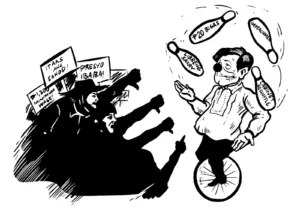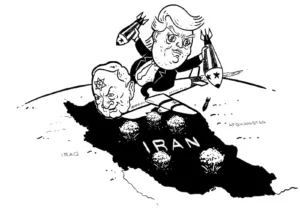
By Jose Maria Sison, NDFP Chief Political Consultant
I have had comrades and friends among military and police officers of the reactionary government since we in the Kabataang Makabayan decided in 1964 to form patriotic groups among cadets at the Philippine Military Academy and the Reserve Officers Training Corps and among young military and police officers.
I had the privilege of being a guest speaker at the Philippine Military Academy and I had the opportunity to criticize the mercenary tradition of the reactionary military since it was established by the US upon the conquest of the Philippines and to propose to the faculty and cadets to uphold the patriotic and revolutionary tradition of the Katipunan in the service of the people.
I also happened to have relatives, former classmates and friends from my Ilocos hometown, province and region who have served as military and police officers at various levels, including the highest level. Thus, it is not surprising if to this day that I have friendly contacts with some police and military and police officers.
In recent weeks, I have had conversations with recently retired military and police officers who maintain close relations with their former subordinates who are active officers under the Duterte regime. In the course of family tours in Europe, they have visited me in Utrecht.
I have learned from them that to a great extent, Duterte has been able to maintain the loyalty and obedience of officers and enlisted personnel by raising their basic compensation, extra benefits and opportunities for making big money through corruption in the handling of public funds and in criminal acts involving extrajudicial killings, fake surrenders, extortion and drug trade.

They decry Duterte’s favoritism in promotions and assignments, mainly in favor of officers previously based in Davao. Together with their side-kicks, these officers engage in criminal and corrupt activities, such as extrajudicial killings and faking surrenders in order to collect reward money, and in inventing intelligence projects in order to pocket the money.
The honest and patriotic officers that I have talked to are strongly critical and even condemnatory of Duterte for systematically making his personally chosen officers to engage in criminal acts and thereby corrupting them in the process in order to keep their personal loyalty to himself.
They admit that as a matter of survival and camaraderie they have kept quiet about Duterte’s favoritism for his flunkeys in terms of promotions, lucrative assignments and the license for criminality and corruption. But they notice that only recently many officers talk openly among themselves against Duterte’s termination of the Visiting Forces Agreement and even against anomalies involving promotions and criminal acts.
They aver that Duterte himself has unwittingly handed down to the anti-Duterte and pro-US officers an issue like the termination of the VFA that has provoked them to question the integrity of Duterte as commander-in-chief and hold him accountable for violations of national sovereignty and the professional standards of the military and police services.
The notice of terminating the VFA has been most shocking to many military and police officers on the presumption that Duterte is going against public interest and is encouraging China to continue encroaching on the exclusive economic zone and extended continental shelf of the Philippines and violating Philippine sovereign rights.
I have asked the retired military and police officers who have visited me how soon or how fast would those who are opposed to Duterte organize themselves and come out to express themselves to the public. They say that no group of officers would dare to come out to denounce Duterte publicly unless conditions such as those in 1983 to 1986 arise and make the US consider junking Duterte.

They estimate that the US will not go beyond slapping the wrist of Duterte for human rights violations if they can still haggle with him over the VFA and other military treaties and believe his pledge to destroy the armed revolution and remove national restrictions on foreign investments.
They acknowledge that in 1983 to 1986, after the assassination of Benigno Aquino, the legal opposition, the Church, the civic associations and the forces of the Left united to oppose the Marcos regime and worked hard to launch increasingly big mass actions until these inspired the anti-Marcos groups in the military to make a coup against Marcos. Though the coup failed, it ignited the people’s uprising on EDSA and around the presidential palace.
They also acknowledge that the long-term armed resistance of the Communist Party of the Philippines and the New People’s Army served to keep up the spirit of defiance and undermined the Marcos regime and led finally to frequent tactical offensives of the NPA from 1983 to 1986.
They think the anti-Duterte groups in the military and police will not act against Duterte unless they see protest mass actions with hundreds of thousands of participants in the national capital region.
They also believe that the super-majority of Duterte in Congress will easily break up upon the rise of gigantic mass actions because the alliance with Duterte is based on pork barrel corruption. Thus, the US will become convinced to embolden the pro-US officers in the military to turn against Duterte and have him replaced on the basis of constitutional succession by his vice president.
The friendly officers who have visited me have wondered why the legal democratic forces on their own or in a broad united front with other anti-Duterte forces have so far not succeeded to launch mass of actions in the hundreds of thousands despite the rich experience in mass protests in the First Quarter Storm of 1970, in the period of 1983 to 1986 when Marcos was overthrown and in 2000 to 2001 when Estrada was also overthrown.
They also wonder why the NPA with its supposedly more than 100 guerrilla fronts has not launched tactical offensives on a national scale and at such a frequency to belie the claim of the National Task Force- ELCAC that the AFP and PNP have either killed or forced the surrender of 11,000 NPA personnel, which is several times more than the officially estimated number of NPA fighters at 2000 to 4000. They laugh at the absurdity and corruption in the faking of NPA casualties and surrenderees.
Still they speculate that if the NPA has truly more than 100 guerrilla fronts, why have not the CPP leadership and NPA national operational command issue a national guideline to launch tactical offensives that would inflict a minimum of 5 to 10 casualties on their military and police opponents per guerrilla front per month. They calculate that the US would certainly junk Duterte if the AFP and the PNP were to suffer a monthly casualty rate of 500 to 1000.
They recall the tactical offensives of the NPA from 1983 to 1986 which worried military and police officers and prompted the US to consider Marcos as a failure at suppressing the armed resistance. They venture to say that the CPP and NPA can learn from their own past and accumulated experience in launching tactical offensives, including ambushes, raids, arrest operations, sparrow and zapper operations.
However, they qualify their estimates and speculations on the potential of the NPA with the hope that the armed conflict will be solved someday by addressing the roots of the armed conflict by negotiating and agreeing on social, economic and political reforms. They say that there are better chances for achieving a just peace after Duterte ceases to be president and his cabal of anti-peace military hawks are out of office.###







